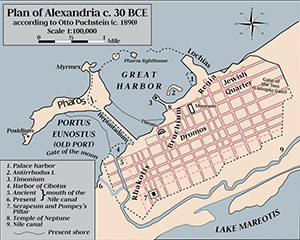 Alexandria is Egypt’s largest port. The port is located in the northwest of the Nile Delta and is connected to the Nile by a canal. The harbor was founded in 331 BC by the Macedonian conqueror Alexander the Great – long before that there was a small fishing village, Rhakotis. Alexander’s teacher was the Greek philosopher Aristotle; he was too a great admirer of Homer. Alexander reached the Egyptian coast at the island of Pharos, about which Homer had already written: “In the midst of the noisy sea, in front of Egypt, lies Pharos. There is a harbor there, suitable for anchoring ”
Alexandria is Egypt’s largest port. The port is located in the northwest of the Nile Delta and is connected to the Nile by a canal. The harbor was founded in 331 BC by the Macedonian conqueror Alexander the Great – long before that there was a small fishing village, Rhakotis. Alexander’s teacher was the Greek philosopher Aristotle; he was too a great admirer of Homer. Alexander reached the Egyptian coast at the island of Pharos, about which Homer had already written: “In the midst of the noisy sea, in front of Egypt, lies Pharos. There is a harbor there, suitable for anchoring ”
And so Alexander the Great had a city built on this site, which would soon become the most beautiful, richest and most intellectual city in the Eastern Mediterranean, mainly because of its lighthouse, its library and its museum. A lot of famous mathematicians, geographers, doctors and physicists settled in Alexandria for a short or longer period, such as the mathematicians Pythagoras, Euclid and Archimedes, the physician Galen, the geographer Eratosthenes who first described the earth as a globe. The geographer and astronomer Claudius Ptolemy, born and raised in Alexandria, wrote the Geographia, a description of the then known world, illustrated with beautiful maps. Ptolemy’s atlas has been used by seafarers for a millennium and a half, including, for example, by Columbus when he crossed the Atlantic Ocean at the end of the fifteenth century.
Alexandria was not only a science center, but also a very important market place and world port; a crossroad of sea routes and caravan routes between Africa, Europe and Asia. The former island of Pharos was connected to the coast by a dam, which created two harbors on both sides of the dam: the eastern and western one. With the conquest of Alexandria by the expansionist Romans in 30 BC, the destruction and demise of the library and museum, the emerging Christianity with its religious strife and repression of dissenters, the glory and tolerance of Alexandria was over. But in 1325, the Moroccan traveler Ibn Battuta still described the city as a unique, glowing pearl.
Egypt was conquered by the Arabs in 640 and by the Turkish Ottoman Empire in 1517. Alexandria lost its importance as a capital and a port. The French general Napoleon Bonaparte saw himself as a kind of reincarnation of Alexander the Great and conquered Egypt in 1798, attracted by the country’s riches and antiquities. In the nineteenth century the significance of Alexandria increased again; traders and intellectuals from all over the Mediterranean returned to the city. The country was a British protectorate at this time. England and France had major interests in the Suez Canal, which was completed in 1869 and which significantly shortened the sailing of European ships to their colonies in Asia. Egypt gained independence in 1922. In 1952 left-wing general Gamal Abdel Nasser came to power, who nationalized the Suez Canal. The successors after him: Sadat, Mubarak, Morsi and El-Sisi followed a zigzag course: from pro-American, nationalist, Islamic fundamentalist to authoritarian. The promising Arab Spring of 2011 stalled, mainly due to repressive military force majeure.
More than five million people live in Alexandria. The eastern harbor is now shallow and is used for fishing boats and yachts; the western port is the commercial port. Several other harbors have been built in the vicinity. The ports have around eighty berths for bulk carriers, container ships, tankers, naval ships and cruise ships. A large terminal is run by Hutchison, the international Hong Kong based port operator. Alexandria’s joint ports handle about 60 percent of Egypt’s foreign trade. The EU is the most important trading partner.




